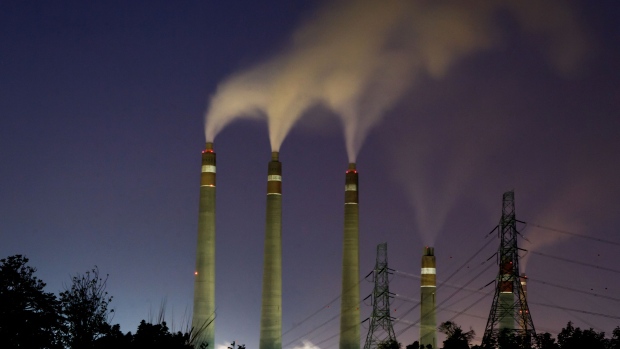Sep 25, 2023
Indonesia’s Carbon Exchange Paves Way for Coal Plants to Trade
, Bloomberg News

(Bloomberg) -- Indonesia launched trading in a new carbon emissions credit market as it aims to curb the climate impact of its coal-dominated power sector and hit net zero by 2060 or sooner.
Trading of carbon credits and other emissions reductions efforts could eventually deliver an economic gain of as much as 3,000 trillion rupiah ($194 billion), President Joko Widodo said Tuesday at a launch event in Jakarta.
Southeast Asia’s top emitting nation is intensely focused on securing adequate funds to overhaul its power sector, and is continuing to negotiate the details of a climate finance package signed last November by Jokowi and US President Joe Biden.
Read More: Money, Politics Imperil Indonesia’s $21.5 Billion Climate Deal
Initial trades on the bourse, operated by the Indonesia Stock Exchange and known as IDX, covered 459,953 tons of carbon dioxide equivalent. Prices opened at 69,600 rupiah — the equivalent of $4.51 — a unit and rose to close at 77,000 rupiah.
That’s far below the cost of similar products in established emissions markets like the European Union.
The market was earlier aimed at incentivizing polluters to limit their climate impact by setting a cap and allowing the trading of any unused credits. Trials had initially focused on coal-fired plants and emissions caps have been assigned to almost a hundred power facilities which are linked to state utility Perusahaan Listrik Negara’s grid. Those plants jointly account for about 86% of the Indonesia’s coal capacity.
Credits traded Tuesday were instead from carbon offsets generated by PT Pertamina Geothermal Energy’s Lahendong power plant in Sulawesi island, and buyers included PT Bank Central Asia, PT Bank Mandiri, oil and gas firm PT Pertamina Hulu Energi and a mining services unit of PT United Tractors, IDX said in a statement.
The Financial Services Authority, which oversees the stock market, expects coal power plants to conduct first trades this year, according to chairman Mahendra Siregar.
“This is just the beginning, so we’re not expecting immediate big interest,” said Paul Butarbutar, executive director at think tank Indonesia Center for Renewable Energy Studies. “It is hoped that as time goes by, and with better dissemination, the domestic carbon exchange will further grow.”
Governments across Asia are putting prices on emissions, though the region’s carbon markets have so far fallen short of delivering any meaningful impact. Price in South Korea and China are regarded as still below the level needed to compel large corporate emitters to cut pollution.
--With assistance from Eko Listiyorini and Heesu Lee.
(Updates prices in fourth paragraph, adds other details)
©2023 Bloomberg L.P.






